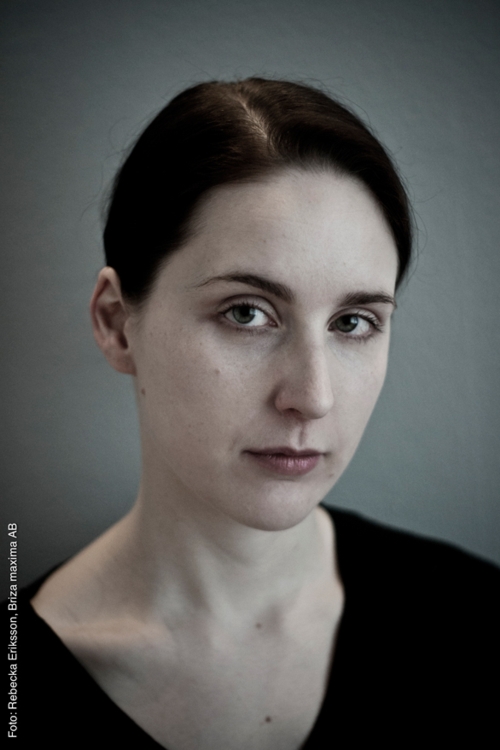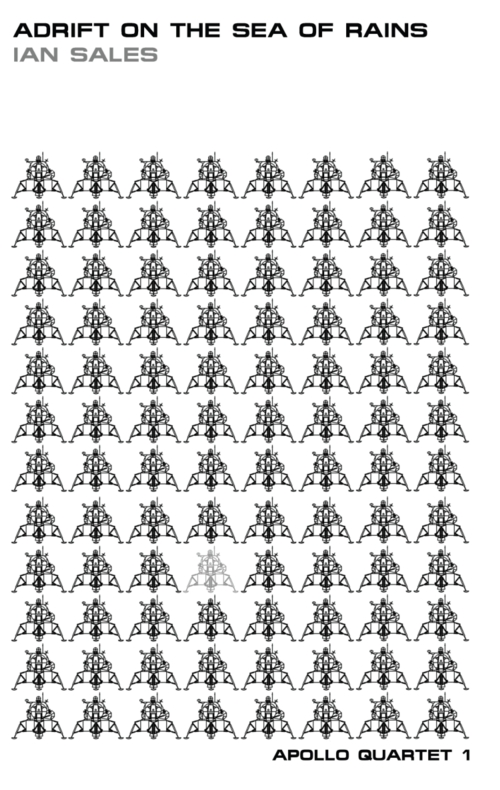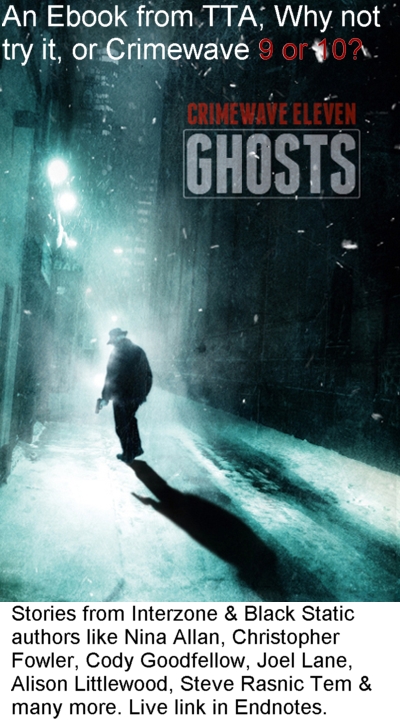Interzone 244 Jan - Feb 2013 (23 page)
Read Interzone 244 Jan - Feb 2013 Online
Authors: TTA Press
Tags: #short fiction, #fantasy, #short stories, #science fiction, #sf, #artwork, #reviews, #short fantasy, #interviews, #eric brown, #lavie tidhar, #new authors, #saladin ahmed, #movie reviews, #dvd reviews, #margaret atwood, #tony lee, #jim burns, #jim hawkins, #david langford, #nick lowe, #jim steel, #tracie welser, #ann vandermeer, #george zebrowski, #guy haley, #helen jackson, #karin tidbeck, #ramez naam

Ann and Jeff VanderMeer are highly respected
editors, and their first publication as proprietors of Cheeky Frawg
is sure-footed, from the intriguing cover onwards. The print
edition is handsome, the ebook perfectly set up (rarer than it
should be, even with major publishers), the introduction ideal, the
author’s afterword fascinating. The print version is perhaps slim
for its price, so the cheaper ebook may prove attractive for UK
readers, but the stories are so intensely emotional that you
wouldn’t necessarily want it to be any longer. I spent much of my
last holiday reading the much shorter books in the Penguin Mini
Moderns series: Barthelme, Calvino, Petrushevskaya, Borges,
Jackson, and so on. The remarkable stories of
Jagannath
would be perfectly at home in that company.

The stories in
Jagannath
cover a wide range of subjects and genres.
When asked what kind of writer you are, how do you answer? Do you
think in terms of genre, and possible markets, when
writing?
I usually tell people I’m a writer. It
annoys some people who think it’s more important what genre markers
my authorship carries rather than what themes or narratives I work
with. I don’t consider genre or markets, except when writing
commissioned work.
Which of the stories in the collection is
closest to your heart, and why?
‘
Jagannath’, I think,
because it was such an excursion into an alien mind. It really took
me to a new level as a writer. I do have a soft spot for ‘Who is
Arvid Pekon?’ too, because I feel sorry for all the things I made
Arvid go through.
One thing the stories share is an intense
emotional quality. Even ‘Aunts’, with barely human characters doing
unspeakable things to each other, is unbearably sad. Is it draining
to write such emotional stories – and to then return to them again
for translation, and publication? How has your relationship with
these stories changed over the years?
Readers seem to have a different emotional
response to my stories than I do. They’ll tell me a story is sad or
creepy, but I don’t have that kind of relationship to my stories. I
write them from the inside, immersing in the personalities and
atmospheres. Looking at a story from the inside is different than
reacting to it as a reader. ‘Aunts’ wasn’t sad or draining to write
because I had the perspective of creatures with a different
emotional register. Maybe it’s this contrast between the characters
and the reader that creates sadness.
Returning to these stories for editing and
publication is fun, especially with the older ones. It’s
interesting to see what themes I’ve picked up over the years and
how my technique has changed.
Elizabeth Hand has written a lovely
introduction to the book, and talks of how the book surprised her
with its “strangeness”. Similarly, Ursula K. Le Guin has “never
read anything like
Jagannath
”. Why do you
think that is?
It’s of course insanely flattering to hear
this from two of my heroes, and two writers who have themselves
gone deep into the strange and experimental as writers. But you’d
have to ask them, because I’ve no idea and I wouldn’t dare to
speculate.
Jagannath
is the first
title from Jeff and Ann VanderMeer’s new imprint, Cheeky Frawg
Books. How did that come about, and what was it like working with
them? Have you had the opportunity to preview any of their other
forthcoming books?
Jeff and Ann knew of my Swedish story
collection and asked to see some translations from it, and liked
them enough to want to see the rest. We added a bunch of new
stories and that was that.
Working with the VanderMeers is a dream.
They’re both completely dedicated to their mission and aren’t
afraid of taking risks in getting new and interesting fiction out
there. I don’t know anyone who works as hard as they do. They’re
both excellent text editors – they can see exactly what you’re
trying to do with a text and are great at helping a story to reach
its full potential. They’ve also been very patient with my English
boo-boos, hehe. The rest of the team working on
Jagannath
have also been a blessing: Adam Mills, Teri Goulding and Jeremy
Zerfoss, all working their asses off to make it happen.
I’ve heard about the stuff that’s coming out
soon, but I haven’t read much of it. Very excited about the Amos
Tutuola collection though, he’s an old favourite.
You attended the Clarion writers’ workshop
in 2010, and that appears very prominently in your bio. Why was the
course so important to you, and what effect did it have upon your
work?
Clarion was tremendously important because
it was my way into writing in English. I learned a lot about myself
as a writer and made huge leaps in both storytelling and English
usage. I drafted ‘Cloudberry Jam’, ‘Reindeer Mountain’ and
‘Jagannath’ at Clarion, and I consider them among my best stories
to date.
I also learned a ton about the industry and
made friends for life. Our class still keep in touch and function
as a support network for each other. We have a lovely
reverse-psychology contest going to encourage each other to submit
stories: whoever racks up the most rejections of the year wins.
It’s been very effective – our class has been incredibly successful
post-graduation.
Philip K. Dick used to have a much larger
presence in French bookshops than in English ones. Are there any
fantasy and science fiction writers who do particularly – or
surprisingly – well in Sweden?
Foreign authors are huge in Sweden because
our indigenous production of fantastic fiction is small.
Interestingly, translations from other languages than English are
on the rise. Readers have switched into reading in English because
there was such a dearth of translations before, so translating from
English to Swedish is not as lucrative now. Some popular names are
Dmitrij Gluchovskij and Sergei Lukyanenko (Russia), Andrzej
Sapkowski (Poland), Cornelia Funke (Germany) and Maria
Turtschaninoff (Finland). Some of these are relatively unknown in
English, as I understand it.
Which writer have you read more than any
other? Who is your greatest influence?
I can’t point out a single writer, but there
are a bunch of authors whose work I admire and frequently read:
Ursula Le Guin, Elizabeth Hand, Tove Jansson, Neil Gaiman, Alan
Moore and China Miéville.
What can you tell us about your new novel?
Are there plans to make it available in English?
Amatka
was published in September
2012, and is a story about colonising a world where physical
reality responds to language. It explores language’s effect on
perception and reality, and the effect of a strange and hostile
environment on what starts out as a socialist utopia. It was also a
prose experiment: as language is strictly controlled in the story,
the prose had to mirror this. Among other things I had to cut out
overt metaphors, homonyms and similes without killing the
prose.
I’m working on a translation, but it’ll take
a while because the prose is relatively advanced compared to how I
usually write in English.
When we arranged this interview, you were on
holiday in a small fishing village. Did you come away with any good
ideas? Was ‘Brita’s Holiday Village’ based on a previous
vacation?
I did get some inspiration for environments
while exploring the mountains of Gran Canaria. You think of it as
this over-exploited tourist beach, but once you leave the coast and
go into the mountains, it’s something completely different, like
being on another planet: vast mountain valleys, volcanic cliffs
rising into the clouds, angry little succulents.
I don’t base stories on events, but I stole
part of the setting for ‘Brita’s Holiday Village’ from an old
holiday village on the slopes of Åreskutan (a mountain in Sweden).
The cottages were dark, monstrous things in some sort of modernist
seventies style, probably cosy in winter but completely misplaced
in a summer landscape. Later on some creatures showed up in my
brain and asked to live there, and kept pestering me until I let
them. Some people have no manners.
* * * * *
Copyright © 2013 the individual
reviewers.
* * * * *
Want More Book Reviews?
Subscribe to
Black Static
for Peter
Tennant's Case Notes in print, or as an Ebook. Live link to E book
sites in the
ENDNOTES
* * * * *

WHIPPLESHIELD BOOKS
www.whippleshieldbooks.com and
[email protected]
"Top notch science fiction that balances
technical savvy with a compelling human story." -
Keith Brooke,
author of ALT.HUMAN
"A powerful new voice in Science
Fiction." -
Andy Remic, author of THEMEPLANET
ebook - £2.99 - limited edition hardback -
£5.99 paperback - £3.99
* * * * *
Also from TTA in print and Ebook.
‘
The hottest crime stories
around’
Ian Rankin
• ‘The best in cutting edge crime
fiction’
Ed Gorman
• ‘Head and shoulders above every other
mystery magazine in look, content and tone’
Ellen Datlow
•
‘The best crime magazine ever’
Mystery Scene
• ‘It just
keeps on getting better’
Crime Time
• ‘Great
thought-provoking fiction’
Shivers
• ‘This is where it’s all
happening’
Terror Tales
• ‘
Crimewave
goes further,
and the quality is higher’
The Times
• ‘No matter how high
the expectations,
Crimewave
always exceeds them. There truly
is no other magazine that brings you the kind of stories you see
here’
sfsite.com
• ‘You can and should subscribe to
Crimewave
. But you absolutely cannot hope to find a better
collection of razor-edged roses anywhere on the planet’
Agony
Column
CRIMEWAVE 11: GHOSTS OUT IN PRINT AS AN
AMERICAN ROYAL PAPERBACK, 240 PAGES
GET EACH VOLUME ABOUT HALF PRICE WITH A
PRINT SUBSCRIPTION!
EBOOK EDITIONS ON AMAZON &
SMASHWORDS.

NICK LOWE
•
The Hobbit: An
Unexpected Journey
•
Rise of the
Guardians
•
the twilight
saga:Breaking Dawn Part 2
•
S
ylvester McCoy in
a birdspatter wig on a stunt sledge drawn by rabbits: I think we
can say that was pretty unexpected, and suggests that Guillermo del
Toro’s passing into the west from
THE HOBBIT: AN UNEXPECTED
JOURNEY
may not have been such a disaster. At the very least,
it’s forced New Line to break their vow never to work with Peter
Jackson again, and Jackson his own vow never to direct another
bloody hobbit picture. And while this first serving of the Jackson
version is still an astounding warg’s breakfast, the film
adaptation’s epic journey from there to back again has managed to
burgle some unexpected treasure from the hoard.
